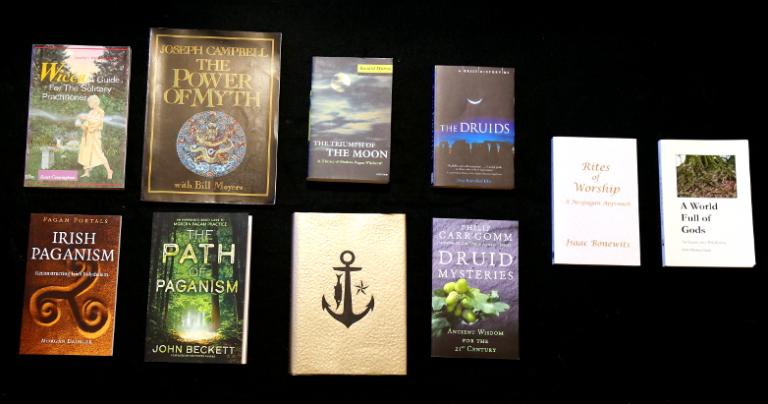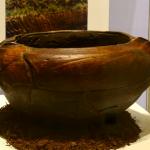Last week I listened to Down at the Crossroads most recent “minisode” podcast. Hosts Chris Orapello and Tara Maguire discussed books that were influential on their Pagan paths. Immediately I thought “I need to write a blog post on my own most influential books.” But I soon found out that was harder than I thought.
I’ve been influenced by a lot of books – how do I separate the top ones from the lesser ones? And influenced when? Throughout my life? When I first discovered Paganism? Most recently?
Instead of trying to pick a handful of influential books, I decided to pick six critical situations on my Pagan journey and the one book that was most helpful in getting me through it. And since my thinking has changed a fair amount since I began, and since there’ve been a lot of good books written over that period, I’m also listing what I’d recommend to someone in a similar situation today.
Getting Started
The Situation: It was 1993 and I was Jon Snow – I knew nothing. An early on-line friend introduced me to Wicca and I was thrilled. Here was the religion I had been looking for: one that recognized the Divine as female as well as male, that found the Divine in Nature, and that showed me how magic was real. I had a lot to learn and I needed to start reading.
The Book: Wicca: A Guide for the Solitary Practitioner by Scott Cunningham. Solitary Practitioner wasn’t the first Pagan book I read – that was The Power of the Witch by Laurie Cabot. But it was Solitary Practitioner that described Wicca and witchcraft in a way that was easy to follow and encouraged me to not just read and think about witchcraft, but to start doing witchcraft.
What I’d Recommend Today: Irish Paganism: Reconstructing Irish Polytheism by Morgan Daimler. Solitary Practitioner remains an excellent choice for beginners, but since I’m neither a Wiccan nor a witch, I prefer to recommend something more in line with my own polytheistic Paganism. Irish Paganism does just that. It’s one of Moon Books’ “Pagan Portals” series of very short introductions – it’s a quick and easy read that covers what we know of ancient Irish Paganism and contemporary attempts to reconstruct it. It can get you practicing in a hurry.
Escaping Fundamentalism
The Situation: I spent eight years dabbling with Wicca and going nowhere, in large part because I hadn’t dealt with the unstated assumptions of the fundamentalist religion of my childhood. On Thanksgiving Night 2001 I had an epiphany that said “get serious or move on!” I knew I had to build a solid religious foundation or I’d be stuck in religious no man’s land forever.
The Book: The Power of Myth by Joseph Campbell and Bill Moyers. For someone who grew up being taught that there is only “one true way” hearing someone of the stature of Joseph Campbell saying “all religions are true but none are literal” was incredibly liberating. I now have some serious issues with Campbell’s work (especially his idea of “monomyth”), but he was the right voice with the right message at the right time for me.
What I’d Recommend Today: The Path of Paganism: An Experience-Based Guide to Modern Pagan Practice by John Beckett. Plugging my own book? Damn right I am. This book is the result of a spiritual journey out of fundamentalism – I did it and so can you. While I don’t have the mainstream reputation of Joseph Campbell, Part I of The Path of Paganism provides a strong intellectual foundation for Pagan religion and instruction in how to practice it. No book can fully exorcise the tentacles of fundamentalism from your soul (that takes lots of work and positive religious experiences) but this one can show you how to do it.
Context for a Deeper Practice
The Situation: After a year of building a foundation for my Paganism, I was ready to start studying and practicing in earnest. I wanted to move beyond the Scott Cunningham books – I needed something to provide context for a serious Paganism.
The Book: The Triumph of the Moon: A History of Modern Pagan Witchcraft by Ronald Hutton. If the books I read in my early exploration of Paganism didn’t explicitly endorse the Margaret Murray fantasies of Wicca as a Pagan survival and of nine million witches killed during the “Burning Times,” they didn’t do much to refute them. I needed real history. Triumph of the Moon showed that while Wicca has ancient roots, it’s a modern invention – and that has no impact on its legitimacy as a religion.
What I’d Recommend Today: Star.Ships: A Prehistory of the Spirits by Gordon White. Triumph of the Moon provides about 150 years of context. Star.Ships provides 70,000 years. It traces the migration of humans, our cultures, and our stories eastward out of Africa, then as the sea began to rise, back to the west. It does not attempt to reconstruct the religion of our Paleolithic ancestors (Gordon specifically warns against it), but it does an excellent job of answering the eternal question “where do we come from?”
Finding Druidry
The Situation: I found Paganism through Wicca, but as much as I wanted to be a witch, Wicca never spoke to me. But when I first read about the ancient Druids, something deep inside screamed “that’s it – that’s me!”
The Book: A Brief History of the Druids by Peter Berresford Ellis. We know very little about the ancient Druids. Ellis examines the available evidence, but unlike Hutton he’s not afraid to extrapolate. Some of his ideas are more speculative than certain, but they strike me as likely – particularly for someone who’s primary interest is in establishing a modern Druid practice.
What I’d Recommend Today: Druid Mysteries by Philip Carr-Gomm. If you’re interested in Druids I strongly encourage you to read A Brief History of the Druids. But for a first book, I recommend one of the three introductory books by the leaders of three of the largest Druid orders: Druid Mysteries by Philip Carr-Gomm, The Druidry Handbook by John Michael Greer, and Bonewits’s Essential Guide to Druidism by Isaac Bonewits. Any of these will give you enough history to get started, but will spend more time on starting a Druid practice. I usually recommend Druid Mysteries first because it’s the shortest and most accessible, but any of the three would be good.
Leading Group Rituals
The Situation: After a year of dedicated solitary practice, I knew I needed a group to go farther. There were no Druid groves of any order near me, so I went to Denton CUUPS to check it out. I never left, and before long I found myself in a leadership position. I needed training. I joined OBOD for their program, but I also needed something that specifically dealt with facilitating public rituals.
The Book: Rites of Worship: A Neopagan Approach by Isaac Bonewits. This book starts with a theory of Pagan worship, then moves into the mechanics of how to do it and do it well. It provides an outline for planning rituals, points out the logistics that need to be taken into account (can everyone see and hear? what will you do if it rains?), and the performance aspects of ritual. Isaac was perhaps the best I’ve ever seen at leading public ritual – he had natural talents I’ll never have. But I learned a lot from him, and especially from this book.
What I’d Recommend Today: Neopagan Rites: A Guide to Creating Public Rituals that Work by Isaac Bonewits. This is a slightly updated version of Rites of Worship, published by Llewellyn instead of Earth Religions Press. There is still nothing like it. I cover some of this in The Path of Paganism, but not in this much depth.
Beginning Polytheism
The Situation: I had experienced the Gods as individual beings, but I was still clinging to the idea of one supreme being. Polytheism may be humanity’s default religious setting, but this is a monotheist-dominated culture. I needed something to make a rational case for polytheism.
The Book: A World Full of Gods: An Inquiry into Polytheism by John Michael Greer. The main theme of this book is that the world-wide diversity of religious experience is prima facie evidence of the diversity of the Divine. Greer explains classical polytheism, why arguments for monotheism fail, and emphasizes the importance of practice. And you don’t have to have a master’s degree in philosophy to understand it.
What I’d Recommend Today: A World Full of Gods: An Inquiry into Polytheism by John Michael Greer. There are several more recent books that do a good job of teaching you how to be a polytheist, but none that make a good, solid, accessible case for polytheism as a religious orientation. A couple have tried – they fall into the category of “if I couldn’t say good things about them I’d conveniently forget to review them.” I’d love to have something more, but A World Full of Gods is more than adequate to get you started.














